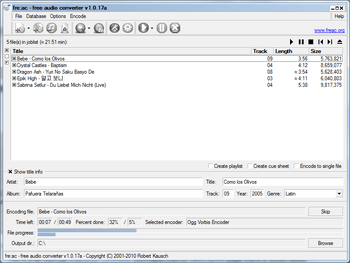fre:ac
 | |
| Developer(s) | Robert Kausch |
|---|---|
| Initial release | 2001 |
| Stable release |
1.0.32
/ 13 March 2018 |
| Preview release |
1.1 Alpha 20180716
/ 16 July 2018 |
| Repository |
|
| Written in | C, C++ |
| Operating system | Microsoft Windows, Linux, macOS, FreeBSD |
| Type | CD ripper |
| License | GNU General Public License |
| Website |
www |
fre:ac is a free audio converter and CD extractor for Microsoft Windows, Linux, macOS and FreeBSD, distributed under the GNU General Public License.[1]
Besides extracting audio from compact discs (with various features including hidden track detection), fre:ac can also convert audio files from one format to another or to the same format but a lower bitrate. fre:ac is compatible with many audio formats such as Ogg Vorbis, FLAC, MP3, MP4/M4A, AAC, WAV, WMA and more.[2][3] fre:ac uses the CDex library to convert from CDs and uses freedb to retrieve artist/song information from the internet which is written to the files as various types of ID3 tags; this library supports cdparanoia which aims to improve audio quality.[4] The user interface is multilingual with 43 languages and is able to be a portable install on a USB drive.
History
The first public version of fre:ac was published in 2001 under the name BonkEnc. The program was originally developed to convert audio to the proprietary lossy/lossless Bonk format, as well as MP3. Over time MP3 became dominant, although fre:ac still supports Bonk. After several 0.x versions, with added support for other formats and extracting audio from compact discs, version 1.0 Beta 1 was released on July 5, 2003 which officially marked the beginning of the beta phase.
Finally, on February 21, 2007 the first stable version of the program, version 1.0, was released.
The project changed its name to fre:ac with the release of version 1.0.17 on November 14, 2010. The latest update, version 1.0.32, was released on Tuesday, March 13, 2018.
Awards
fre:ac won the SourceForge Community Choice Project of the Month award in October 2015.[5] In May 2018 it was selected as the SourceForge Staff Pick Project of the Month.[6]